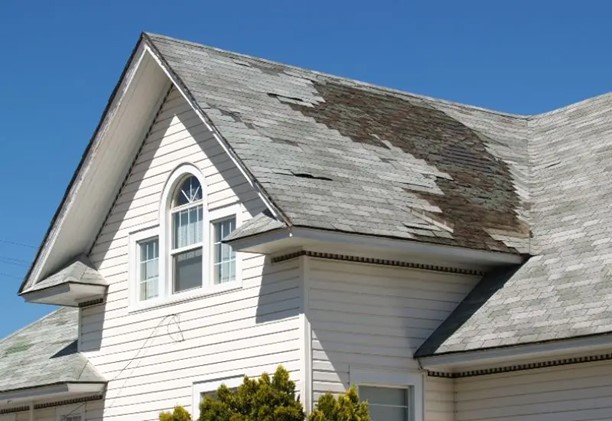
Bad weather can wreak havoc on your roof. Learning how different weather conditions impact your roof can help you take preventative measures to protect it. When all else fails, contact a professional for storm damage roofing repair.
Types of Roof Storm Damage
The unpredictable weather in Delaware, Pennsylvania, and Maryland can damage your roof any time of year. Here’s what to watch out for:
- Hail damage: Hail can dent metal roofs, crack or shatter stone roofing, and lead to granule loss on asphalt shingles. This damage may compromise your roof’s integrity and aesthetics.
- Snow and ice damage: Heavy snowfall adds weight to your roof, causing structural stress. Ice dams are another issue, causing water to back up under the shingles and leak into the attic.
- Heat and UV radiation: Summer heat can be brutal on your roof. High temperatures cause roofing materials to expand and contract, leading to cracks and warping over time. Prolonged exposure to UV rays can also degrade asphalt shingles, making them brittle and less effective at protecting your home.
- Heavy rain and leaks: Persistent rainfall can cause significant roof damage from storms. If water infiltrates small cracks or gaps in the roofing material, you’ll end up with leaks and water damage inside your home.
- High winds: Gale-force winds can lift or loosen shingles, blow debris onto the roof, or even tear off entire sections. These winds can cause immediate damage and expose your roof to further harm from subsequent rainstorms.
- Debris and tree damage: Branches and leaves accumulating on your roof can clog the gutters and downspouts. This traps moisture and creates conditions for mold, algae, and moss.
- Humidity: High humidity can also promote unwanted organisms on your roof, damaging roofing materials and creating health hazards.
Protect Your Roof from Storm Damage
Don’t let bad weather destroy your roof! Here are some proactive steps to protect your investment:
- Regular inspections: Conduct routine inspections to check for missing or damaged shingles, cracks, and leaks. Address any issues promptly to prevent further harm.
- Trim trees: Keep branches trimmed back to stop them from falling on your roof during storms.
- Clean the gutters: Ensure your gutters and downspouts are clear of debris to avoid ice dams and water backups.
- Check flashing and sealants: Inspect the metal flashing around chimneys, vents, and skylights and replace any damaged areas you find.
- Maintain ventilation: Proper attic ventilation lowers the roof temperature and reduces exposure to humidity, reducing the risk of thermal stress and moisture-related problems.
- Address damage promptly: If your roof sustains storm damage, make temporary repairs immediately and arrange for permanent fixes as soon as possible.
Schedule Roof Storm Damage Repair
Ferris Home Improvements is a local, family-owned company serving Delaware, Southern Pennsylvania, and parts of Maryland. If bad weather has damaged your roof, contact us today for a free assessment. We’ll recommend a cost-effective storm damage roof repair or replacement based on your needs.
